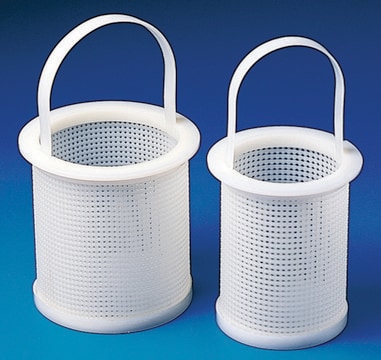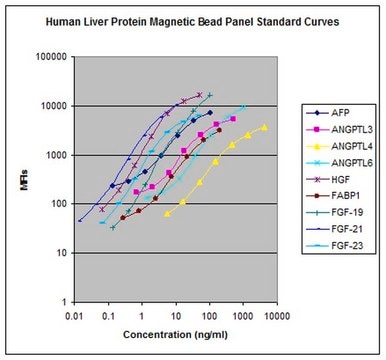HRNKLMAG-51K-01
MILLIPLEX® Human RANKL Magnetic Bead- Single Plex - Metabolism Assay
This MILLIPLEX MAP Human RANKL Magnetic Bead- Single Plex, HRNKLMAG-51K-01 is a Metabolism single plex assay. The analyte available for this kit is RANKL.
Synonym(s):
Human RANKL Detection, Human RANKL Magnetic Beads, RANKL Magnetic Bead Kit
About This Item
Recommended Products
Quality Level
species reactivity
human
manufacturer/tradename
Milliplex®
assay range
accuracy: 92%
sensitivity: 5.0 pg/mL
standard curve range: 4.88-20,000 pg/mL
technique(s)
multiplexing: suitable
compatibility
configured for Single Plex
detection method
fluorometric (Luminex xMAP)
shipped in
wet ice
General description
MILLIPLEX® Human RANKL Single Plex Kit is used for the quantification of RANKL in human serum, plasma and cell / tissue culture supernatant samples. This kit uses a 96-well format, contains a lyophilized standard cocktail, two internal assay quality controls and can measure up to 38 samples in duplicate.
The Luminex® xMAP® platform uses a magnetic bead immunoassay format for ideal speed and sensitivity to quantitate multiple analytes simultaneously, dramatically improving productivity while conserving valuable sample volume.
Panel Type: Bone
Application
- Analyte: RANKL
- Recommended Sample Type: Human serum, plasma, cell/tissue culture supernatants and lysates
- Recommended Sample Dilution: 25 uL per well of 1:2 diluted serum or plasma; cell/tissue culture samples may require dilution with an appropriate control medium.
- Assay Run Time: Overnight (16-18 hr) at 2-8°C
- Research Category: Metabolism
- Research Subcategory: Bone
Packaging
Other Notes
Legal Information
Disclaimer
Signal Word
Danger
Hazard Statements
Precautionary Statements
Hazard Classifications
Acute Tox. 3 Dermal - Acute Tox. 4 Inhalation - Acute Tox. 4 Oral - Aquatic Chronic 2 - Eye Irrit. 2 - Skin Sens. 1
Storage Class Code
6.1C - Combustible acute toxic Cat.3 / toxic compounds or compounds which causing chronic effects
Certificates of Analysis (COA)
Search for Certificates of Analysis (COA) by entering the products Lot/Batch Number. Lot and Batch Numbers can be found on a product’s label following the words ‘Lot’ or ‘Batch’.
Already Own This Product?
Find documentation for the products that you have recently purchased in the Document Library.
Our team of scientists has experience in all areas of research including Life Science, Material Science, Chemical Synthesis, Chromatography, Analytical and many others.
Contact Technical Service










